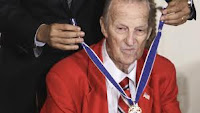The Executive Order creating the Medal of Freedom states that it should be given to individuals who make "especially meritorious contributions to the security or national interests of the United States, to world peace, or to cultural or other significant public or private endeavors," President Obama emphasized that the individuals who receive the medal “reveal the best of who we are and of who we aspire to be.” He added "they remind us that we each have it within our powers to fulfill dreams, to advance the dream of others and to remake the world for our children."
So why would a baseball player, Stan Musial, and a basketball player, Bill Russell, be included in this august group? More than a few international folks don’t get it, and I think the answer to this question reveals a lot to us as Americans and the iconic role of athletics in our culture.
An odd place to start might be to remember that only the United States of all countries that award Rhodes scholarships ever took Cecil Rhodes statement of “vigorous body” to link the award for decades to intercollegiate athletic participation. Americans have always believed that the Greek ideal (even when they did not know it was a Greek ideal) matters that athletic excellence epitomizes the unity of mind and body.
The United States, alone of all countries, supports four, count them four! major pro leagues—baseball, football, basketball, and hockey. This does not count fledgling soccer leagues and the endless array of tennis and golf tournaments as well as minor sports like lingerie football. The country chooses to saturate itself in viewing, following, thinking and obsessing about and spending on athletic competition.
Musial and Russell are not the first athletes to receive the award and the inclusion of them in this group reminds us of two aspects of sport. First, it is a valued and honored domain of life that possesses its own excellence. But we have Hall of Fames for that.
The Medal of Freedom, secondly, pushes beyond simple achievement of excellence. A person can be a great athlete or artist or businessperson and be an awful human being. The Medal honors impact and courage to extend one’s actions to better the world.
Both these athletes offer a glittering and fabulous array of accomplishments and milestones like 24 all-star awards or 11 NBA championships. Both men won championships but also went on to coach and win championships. Russell stood as the first black coach in NBA history. In this he was a pathfinder as were many other athlete Medal of Freedom winners. He, like they, broke barriers but also changed the conversation about the capacity of black citizens.
The commentaries on both awards highlighted common words like “gentleman,” “dignity,” or “class.” They reflect not just the superb accomplishments of these athletes or even their later philanthropic work. These words etch the importance of a way of being in the world.
These two persons like many of their predecessors such as Arthur Ashe, Jackie Robinson, Billy Jean King, and Joe DiMaggio revealed to us not just a glorification of achievement but how a person wears their greatness and models this for those who follow. This capacity to carry oneself with grace under pressure means even more when like Russell, Robinson, Ashe, or King an athlete must endure doubt, hostility and ridicule because of their race or gender. This “class” provides a mirror to the society of its own grotesque prejudices. The reflection bigots see is not reactive or vicious, but a person of dignity, talent and tenacity who achieves what the bigot admires despite prejudices.
The sports category carries so much importance in the United States’ pantheon lies in its attraction as a pure meritocracy. The founding myth of America and its dream depends upon the ideal that we all compete, if not on a level field, at least one that gives us a chance, a fair chance to develop and reveal our talent.
United States’ moral legitimacy depends heavily upon the claim that anyone has the fair chance to compete and succeed. It is an ideal too often violated at birth for so many that will be doomed to the destiny of their nativity position. But sport, sport presents a brutally honest and transparent field of competition. There are not safe havens and excellence, smarts and commitment can and often do WIN. The sheer openness of sport competition, the clarity of its rules and visibility of its victories and defeats goes farther towards ensuring merit-based achievement than in almost any other area of American life.
45 percent of the Medal of Freedom Winners in the sports category are black Americans. This predominance attests to that denial of opportunity in so many areas of life, including sport. Their presence in the sport category emphasizes the relentless success and achievement of black athletes when finally given a fair, even if not level, chance to compete. Americans have used sport to prove to itself that black persons can have access to a real meritocracy.
The award of the Medal of Freedom to sports figures reminds us of the cultural role athletes play in the United States, it also reminds us how mfar we have to go to live up to our ideals of freedom.


nike lebron 15
ReplyDeletekyrie irving shoes
kevin durant shoes
goyard handbags
supreme clothing
goyard bags
yeezy boost 350
golden goose outlet
spongebob kyrie 5
supreme clothing
cnrd05n26d
ReplyDeletegolden goose outlet
golden goose outlet
golden goose outlet
golden goose outlet
golden goose outlet
golden goose outlet
golden goose outlet
golden goose outlet
golden goose outlet
golden goose outlet